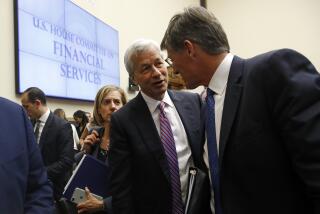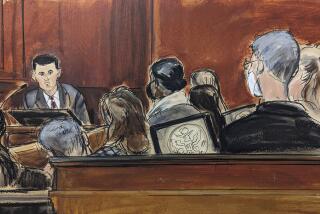JPMorgan CEO testifies he did not mislead shareholders
WASHINGTON — Facing more congressional heat about JPMorgan Chase & Co.’s huge trading loss, Chief Executive Jamie Dimon said he did not mislead shareholders about the extent of the problems as a financial regulator revealed that the bank’s public disclosures were under scrutiny.
“We disclosed what we knew when we knew it,” Dimon told the House Financial Services Committee on Tuesday.
It was the second time in less than a week that he testified on Capitol Hill about JPMorgan’s more than $2-billion trading loss. Dimon faced tougher questions from Democrats and Republicans than he did from the Senate Banking Committee last week as both parties tried to position themselves as the protectors of taxpayers from the risk of future bank bailouts.
Five financial regulators also testified at the more than four-hour hearing about what went wrong at the bank’s Chief Investment Office and why they didn’t catch the trouble earlier.
Securities and Exchange Commission Chairwoman Mary Schapiro said her agency was investigating whether JPMorgan complied with public disclosure rules, specifically regarding changes to how it measures the risk of loss on portfolios.
In disclosing the huge losses on May 10, Dimon told analysts and reporters that the company had changed its so-called value-at-risk model in the first quarter, Schapiro said. Such changes must be disclosed and the SEC was looking into the extent of that disclosure and whether it was adequate, she said.
Schapiro wouldn’t comment on whether Dimon misled investors in mid-April when he told analysts on a conference call that reports about risky trades emanating from the bank’s London office were “a tempest in a teapot.”
But she said executives of publicly traded companies must give accurate information about their finances when speaking in public.
“If you choose to speak, you absolutely must speak truthfully and completely and not allow yourself to leave any kind of misleading impression from the information that you’re putting out,” she said.
Dimon said his comments were “totally a positive, accurate reflection of what I believed at the time.”
“On April 13, I believed it was a tempest in a teapot,” he said. “I obviously was dead wrong, and I deeply regret having said it.”
Dimon apologized that JPMorgan’s trading loss was distracting Washington officials from fully focusing on the European debt crisis.
“I’m sorry I’ve taken up so many people’s time with this loss because it is not significant in the global scheme of things,” Dimon said.
He reiterated that the bank was embarrassed by the loss and that it “let a lot of people down and we are sorry for it.”
But he also said the loss should be put into perspective, saying no customer or taxpayer money was lost. JPMorgan would soon report that it was “solidly profitable” in the second quarter, Dimon said.
Some lawmakers weren’t satisfied with the explanation. They questioned why he and other JPMorgan executives had lobbied against new financial rules being drafted by regulators, including one that would mandate more disclosure of derivatives trading done by overseas units.
“Lobbying is a constitutional right and we have a right to have our voice heard,” Dimon said.
“I’m not questioning your right to lobby,” said Rep. Maxine Waters (D-Los Angeles). “I’m questioning what’s in the best interest of the American public.”
Rep. Sean Duffy (R-Wis.) asked Dimon how regulators could oversee a huge bank like JPMorgan if they were unable to spot the bank’s risky trading before the losses got so large.
“Are you too big to fail?” Duffy said, warning against future Wall Street bailouts.
“No, we’re not too big to fail,” Dimon said.
But Duffy pressed him on what would happen if the losses by JPMorgan, which has $2.3 trillion in assets, were higher. Asked if it was fair to say the bank could lose more than $500 billion or $1 trillion at some point, Dimon responded, “Not unless this Earth is hit by a moon.”
More to Read
Inside the business of entertainment
The Wide Shot brings you news, analysis and insights on everything from streaming wars to production — and what it all means for the future.
You may occasionally receive promotional content from the Los Angeles Times.











